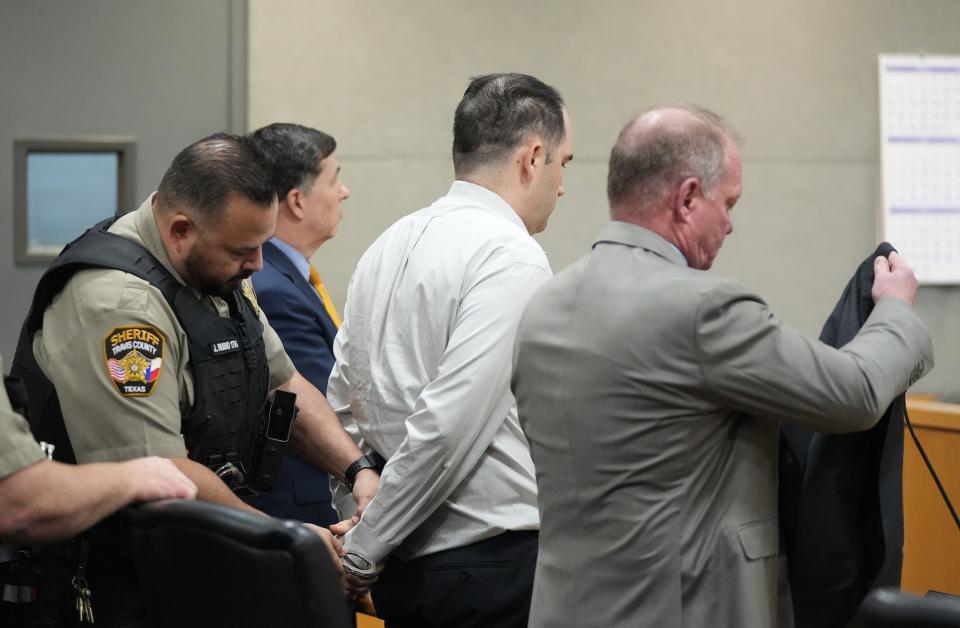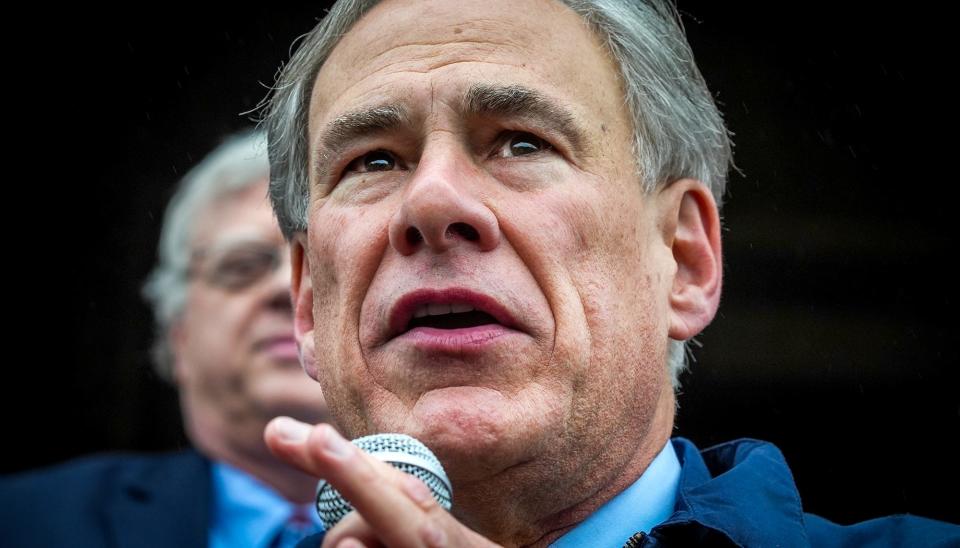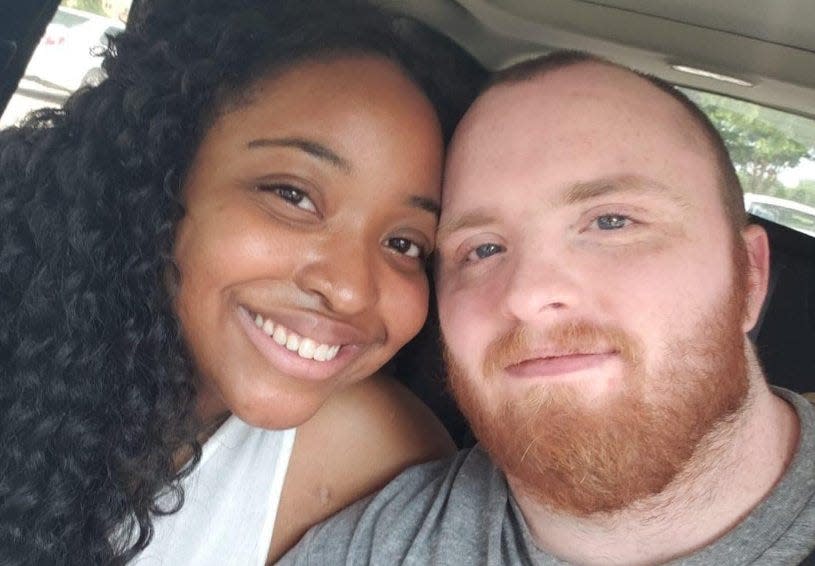Greg Abbott wants to pardon a convicted killer. Here's how the process works in Texas.
- Oops!Something went wrong.Please try again later.
Had he been governor of Texas a century ago, the pardon that Gov. Greg Abbott wants for convicted murderer Daniel Perry could have been granted by a single stroke of his pen.
Instead, both Abbott and Perry, the Army sergeant who last week was found guilty of shooting and killing Garrett Foster during a Black Lives Matter protest six blocks south of the Texas Capitol in 2020, will have to wait as a purposely cumbersome process plays itself out. The decision on how it plays out is not Abbott's alone, but the influence the governor has on the outcome cannot be denied.

Abbott, a Republican in his third term, signaled with a tweet — less than 24 hours after a Travis County jury unanimously voted to convict Perry — that he intended to grant the pardon. Under pressure from Fox News personality Tucker Carlson and other conservative opinion-shapers, Abbott said the jury had essentially disregarded Texas' "stand your ground" law that permits someone to employ deadly force in self-defense.
In his tweet Saturday afternoon, Abbott also noted that he needs a majority recommendation from the Texas Board of Pardons and Paroles before he can act. Unsaid in the governor's post was that all seven board members owe their appointments to him.
On Monday, the board issued a statement saying it would be considering the governor's request "immediately."
The chairman of the Texas Legislative Black Caucus expressed outrage over any question of a pardon in Perry's case.
“In a state where this governor often touts the 'rule of law' and cracking down on crime, here we see him openly stating his intention of pardoning a convicted murderer who took the life of a protester," state Rep. Ron Reynolds, a Houston Democrat, said in a statement. "Garrett Foster should still be with us today. His murder is on the hands of an individual who, as a jury already deliberated and ruled on, is guilty. "
Why is Texas' pardon process complicated?
In Texas' early years, governors made liberal use of their pardon powers, usually to the benefit of their politically connected friends and allies, according to the Texas State Library and Archives Commission. In fact, up to 12% of the inmates in the state prison system in the 19th century could expect to receive a pardon from the governor, the commission says on its website.
But by the 1920s, then-Gov. Miriam "Ma" Ferguson during her two nonconsecutive terms had granted some 4,000 pardons. Unproven but persistent rumors at the time suggested Ferguson and her husband, James "Pa" Ferguson when he was governor, had granted pardons in exchange for cash.
Court: Daniel Perry's lawyers seek new trial, say excluded evidence may have proved self-defense
Voters in 1936 approved a constitutional amendment intended to take the stain of political influence out of the pardon process. With a near 72% majority, voters curbed the governor's power by requiring that any pardon first be recommended by the Texas Board of Pardons and Paroles. But, under state law, a governor can request that the board make such a recommendation.
Does the Board of Pardons and Paroles have to obey the governor?
Technically, no. Like most of the arms of state government, the board is made up of members who, though appointed by the governor, serve fixed terms and not at the pleasure of the governor. In this case, six years. But the terms are staggered so all of the seats do not come open at the same time. Governors serve four-year terms, so they come into office with members of boards and commissions appointed by their predecessor.

However, since he is now in his ninth year in office, every state board member, regardless of which state agency, has been appointed by Abbott.
Has Abbott pardoned convicted criminals in the past?
Like governors before him, Abbott has pardoned numerous offenders. But, as is the case with his recent predecessors, pardons tend to be reserved mostly for people who committed nonviolent crimes, or who found themselves on the wrong side of the law for reasons that were not necessarily all their fault.
For instance, Abbott has pardoned several victims of human trafficking. A recent case is that of Robbie Ann Hamilton, which was described in detail on the governor's website when her pardon was announced in January 2020.
"She was lured into sex and human trafficking around the age of 15," said the write-up that included accounts of her efforts to escape the sex trade and to find religion while in prison. "From there, her life took a downward spiral that included some petty crimes — none of which involved harming or endangering the life or safety of another person."
“She is a testament to the principle that our lives are not defined by how we are challenged. Rather they are defined by how we respond to those challenges," Abbott said in the statement.
In 2018, Abbott did commute the death sentence of death row inmate Thomas Whitaker of Harris County because his accomplice, who actually pulled the trigger, was not condemned to death. The action did not set Whitaker free, however, and he will spend his life in prison with no possibility of parole. In that case, Abbott by law was allowed to act only upon the recommendation of the Board of Pardons and Parole.
Is the pardon being considered for Daniel Perry unique?
Yes, for a number of reasons. Scott Henson, a former political strategist and now a researcher and writer on the intricacies of the Texas criminal justice system, said modern Texas political leaders have almost "a complete allergy" to nearly everything related to pardons and clemency for anyone associated with violent crime.
In fact, Henson could find no precedent in the post-Ferguson era of a governor pardoning someone convicted of murder, much less moving to pardon someone who had not even been sentenced yet.
In addition, the Perry trial was not carried live on television or streamed over the internet, meaning that Abbott nor any of the conservatives pushing for Perry's pardon could have firsthand knowledge of the testimony presented or the evidence submitted into the record.
On Tuesday, after it was clear the parole board planned to act on Abbott's request, Travis County District Attorney José Garza in a formal letter to the board asked that he be allowed to present to the members the evidence heard by the jury.
"Before making any decision, I implore you to review the trial transcript, evidence from trial officials that may have an impact on public safety, and request input from the victim's family as to how a pardon would impact them," Garza wrote.

Billy Humphrey, a Sam Houston State University adjunct professor of criminal justice who rose through the ranks in the Texas Department of Criminal Justice to the post of senior warden, said he is not aware of a governor acting so quickly to signal support for issuing a pardon, much less appearing to follow the lead of a TV commentator.
Politics, Humphrey said, should play no role in decisions on matters of pardons and clemency.
"I've never seen that before," said Humphrey, who served as a parole commissioner from 2009 to 2011. "If he wants to pardon somebody, certainly he's got the ability to do it. But to me, that's just divisive politics."
Henson agreed that the facts surrounding the Perry case appear to taint what should be a sober and deliberate process, especially for someone like Abbott who once served as a Texas Supreme Court justice and as the state's attorney general. But, Henson added, governors have a duty to grant pardons whenever they determine someone is unjustly facing prison or even the death penalty.
"It's literally their job," said Henson, who since 2004 has been the primary author of the criminal justice blog, "Grits for Breakfast." "The criticism of Abbott in this case is that it's politically opportunistic and two-faced. Why does a guy who shoots up a Black Lives Matter protest deserve a pardon but nobody else does?"
Will the public be able to watch the Board of Pardons and Parole as it considers Abbott's request?
It's unlikely. According to the board's website, public meetings are generally the exception, not the rule.
"The Board of Pardons and Paroles is required to meet quarterly to discuss policies, procedures and other matters of public business," the site says. "The Board does not consider individual offender cases during meetings."
John C. Moritz covers Texas government and politics for the USA Today Network in Austin. Contact him at jmoritz@gannett.com and follow him on Twitter @JohnnieMo.
This article originally appeared on Austin American-Statesman: Greg Abbott weighs Daniel Perry pardon; Why the process is complex

